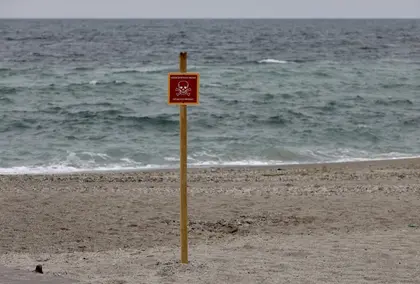Officials in the Black Sea resort city Odesa are grappling with a possible launch of the region’s economically-critical summer resort season, in the face of Russian Federation (RF) missiles, and sea mines but probably not amphibious assault.
A major industrial center and trading port in its own right, Odesa is Ukraine’s third-most-popular tourist destination, after Lviv and the capital Kyiv. Most visits take place during the warm months to take advantage of Odesa’s well-developed seaside hotel and restaurant infrastructure and are critical to thousands of small businesses in the region servicing the tourist sector.
JOIN US ON TELEGRAM
Follow our coverage of the war on the @Kyivpost_official.
Traditionally, the Odesa summer season starts on June 1 and ends when the Black Sea cools too much for swimming, usually in the middle of September.
Serhiy Bratchiuk, head of the Odesa regional defense command, in May 4 comments to the News24 television channel, said that although Odesa cafes, hotels and restaurants can and likely will be operating this summer. However, full, unfettered opening of the city’s six-kilometer beach waterfront to sunbathers and swimmers any time soon is unlikely, due to the threat of sea mines and land mines deployed by the RF, he said.
“We will need to de-mine our beaches and waters, before that (opening beaches to tourists without limits),” Bratchiuk said. “We’ve already had incidents when the current has brought sea mines to our beaches…the Russians threw the mines into the Black Sea.”
In mid-March, according to news reports, RF naval troops based in Sevastopol Crimea launched more than 400 sea mines to drift in the Black Sea. In the following weeks, NATO mine-hunting warships discovered the mines as far away as the territorial waters of Turkey, Bulgaria, and Romania. The most recent sea mine found by Odesa sappers in local waters was defused on May 3, Bratchiuk said.
“The moment we can, we will do it (clear Odesa beaches),” he said. “But the resort season right now, to put it mildly is under threat. It won’t take place in the normal way like we’re used to (in peace). We have to make sure our citizens are safe as the first priority.”
Odesa regional officials were working on a plan to allow tourist visits to seaside businesses and resorts while banning actually walking on most beaches or entering waters not fully checked for mines, he said.
In a separate May 5 statement, Bratchiuk said the most serious threat to Odesa citizens remains RF long-range missiles aimed at infrastructure or homes and businesses in the region. A Kremlin missile thought possibly to be aimed at Odesa region rail centers struck an apartment building on May 4, killing a teenager.
Odesa Mayor Gennady Trukhanov in comments to local television on May 5 said UAF air defenses knocked down two other RF cruise missiles in the attack and called for the central government to build “an anti-missile wall” of anti-aircraft gun and missile units on Odesa’s shore, to protect not just Odessites but inland regions also targeted by RF missile firers, and to allow the Odesa region’s economy to move towards a more normal footing.
“If this wall is built, our region (Odesa) will protect not only Ukraine but all of Europe! It is a chance not just to end the war in our country, but to prevent its expansion into other European countries,” Trukhanov said.
According to May 4 article by Forbes magazine citing military analysts, the RF’s Black Sea fleet is due to losses and depleted missile supplies unlikely to attempt a major amphibious landing in the Odesa region but, given Ukraine’s near-total lack of means to counter RF warships, the Kremlin’s vessels could continue intermittent missile and sea mine launches from waters off Ukraine’s seashore for some time.
Ukraine has appealed to NATO nations for anti-ship missiles to push RF warships away from Ukrainian shores and inhibit launches of missiles and mines. Several countries – among them the US and Britain – have said they are considering the idea. At present, the only anti-ship missile known to be available to Ukraine’s Armed Forces (UAF) is the potent Neptune missile, but only in small numbers.
You can also highlight the text and press Ctrl + Enter



